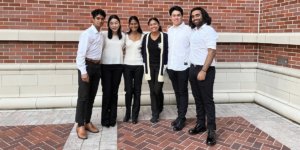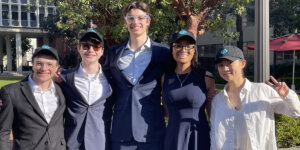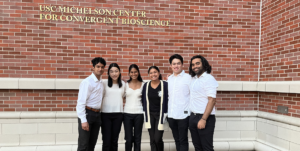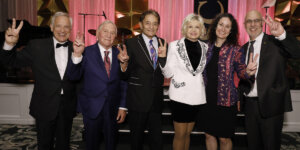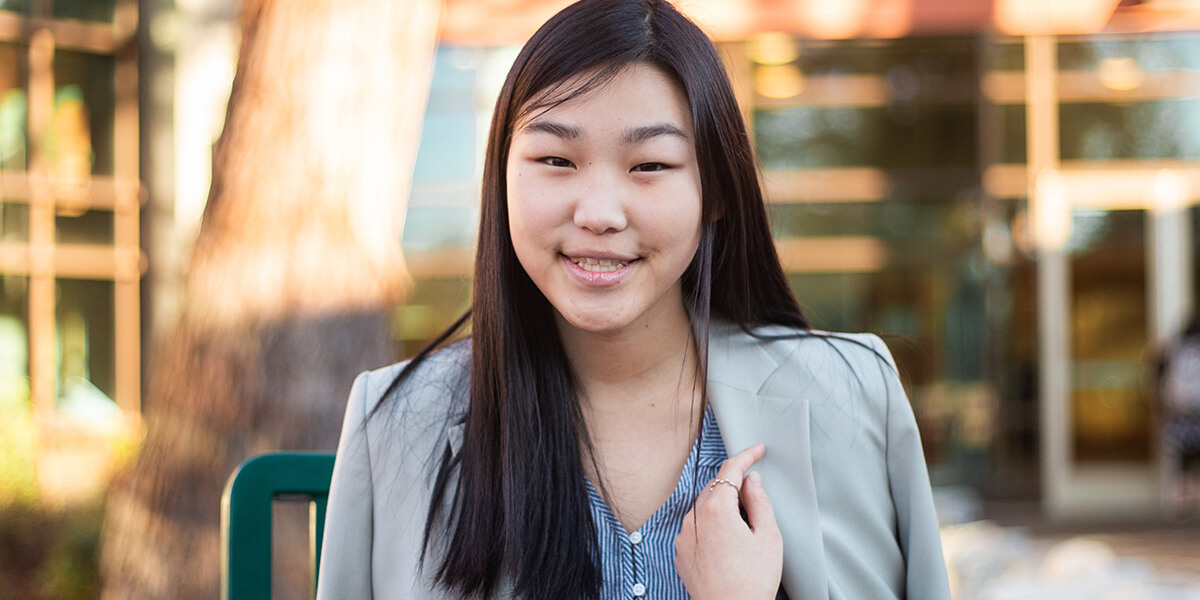
Hannah Lee, a USC junior majoring in human biology, is part of Remedy, one of 10 student teams participating in this year’s Min Family Challenge (Photo/Courtesy of Hannah Lee)
Many people experiencing homelessness suffer from chronic health conditions that require treatment. Unfortunately, thieves often steal their prescribed drugs and sell them on the street for illicit profit
Hannah Lee believes her team of young business-builders has come up with a way to cut down on the theft of potentially lifesaving medications and, in the process, protect the health of many vulnerable unhoused people.
Lee, a USC junior majoring in human biology, Isha Sanghvi, a junior majoring in neuroscience, and Vivianna Camarillo, a recent USC graduate, cofounded Remedy. The startup, an entry in this year’s Min Family Challenge, has developed a flexible pill container in which the homeless can discreetly place their medicines. Each of the container’s seven individual segments – one for each day of the week, can store up to 11 pills.
Unlike orange prescription pill bottles that, according to Lee, attract the attention of malefactors, Remedy’s solution makes “it easy to store medicine and reduces the possibility of their drugs being stolen.”
As an added bonus, she added, unhoused people could also put their medicine in a wearable, soft pouch developed by Remedy that fits comfortably against their bodies, even when sleeping
Addressing ‘wicked problems’
Remedy is one of 10 competing for the $50,000 grand prize at the 2021 – 2022 Min Family Challenge, which remotely held its kickoff on Dec. 1. MFC encourages would-be social entrepreneurs to build companies to benefit the underprivileged locally, nationally, and even worldwide.
“The Min Family Challenge is one of USC’s premier business model competitions and addresses wicked problems at the intersection of societal grand challenges and technology,” said Yannis C. Yortsos, dean of the USC Viterbi School of Engineering. “Engineers and their imaginations will help us meet the needs of the 21st century.”
MFC launched in October 2015 with a generous gift from Bryan Min, B.S. ISE ’86 and a member of the USC Viterbi Board of Councilors, and his family: his wife Julie Min; their son Brandon, a USC Viterbi graduate in industrial systems engineering; and daughter Brittany, also a USC graduate.
At the kickoff, Bryan Min said he “looks forward to this every year, and we’re soon going to really get a chance to see the wonderful things [MFC student teams] bring forward.”
The other 2021 – 2022 MFC semifinalists include:
Ch’aak’ (Eagle): A cold weather, lightweight resource delivery drone that acts as a cheap last-mile-transport alternative for remote, coastal locations in Southeast Alaska and elsewhere
Eco2Go: Creating a container made from biodegradable plastic film and leftover plastic bottle waste to ensure access to affordable clean water and sanitation management for underserved communities
Equilateral: An AI platform that generates repetitive parts of apps, trains programmers in developing countries and matches certified people to work on projects
MicroMaterna: A low-cost paper microfluidic screening device for multiplexed detection of an array of maternal preeclampsia biomarkers
Refresh LA: A marketplace that connects surplus food from restaurants to price-savvy, purpose-driven college students
SABA: A digital platform for sustainable fashion
Scout: Developing a product that makes second-hand fashion more accessible for both consumers and sellers
SmartStorage: A mobile application that suggests customized tips and best practices for keeping perishable food longer
SustainG: SustainG is a BaaS platform and a mobile app with an open-source API that aims to simplify energy-saving and planning for students residing in university housing units.
Fostering innovation
Twenty-one teams competed for just 10 spots in this year’s MFC, which will crown a winner in April. This year’s cohort features several sustainability and medically focused proposals.
David Gerber, MFC co-director and associate director for the Office of Technology Innovation & Entrepreneurship, or TIE, said MFC plays an important role in fostering innovation at USC.
“MFC represents an opportunity for students to engage in the entrepreneurial process,” he said. “It’s important because taking that leap often requires a driver, and MFC is that catalyst.”
As in the past couple of challenges, this year’s MFC theme was inspired by the 2030 Agenda for Sustainable Development, a universal call to action to end poverty, protect the planet and improve the lives of people everywhere.
Participants in this year’s MFC will attended workshops developed by TIE and the Innovation Node-Los Angeles that focus on customer discovery, storytelling, law, and business modeling. They can also apply for $250 to cover customer discovery expenses and up to $1,000 to defray the costs of software, materials and supplies, said Trina Gregory, MFC co-director and TIE associate director.
MFC constantly evolving
MFC has consistently evolved over the years.
In 2018, MFC took USC Viterbi and other students to Texas to meet with Hurricane Harvey survivors. Participants focused on developing sustainable ventures to enhance relief and recovery efforts for victims of that and other natural disasters.
In 2019, the challenge focused on the world’s growing refugee crisis. As part of a special class, CE 499: Engineering Innovation for Global Challenges, students went to Lesvos, Greece, to meet with refugees and devise innovative solutions to meet the needs of people in crisis.
Last year’s winner, Social Benefit, aims to help end cyclical homelessness and poverty by creating a digital platform that brings transparency to government benefits for low-income populations and their case managers.
Gregory, the MFC co-director, said she expects great things from this year’s challenge.
“These teams can make a difference,” she said. “We like to think of them starting small or locally but with the potentially to expand to other communities, other states and even other countries.”
Published on December 9th, 2021
Last updated on December 9th, 2021




